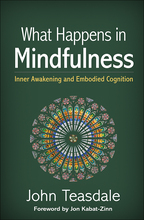What Happens in Mindfulness
Inner Awakening and Embodied Cognition
John Teasdale
Foreword by Jon Kabat-Zinn
Hardcovere-bookprint + e-book
Hardcover
orderMay 4, 2022
ISBN 9781462549450
Price: $43.00 268 Pages
Size: 6" x 9"
e-book
orderApril 6, 2022
PDF and Accessible ePub ?
Price: $43.00 268 Pages
ePub is Global Certified Accessible
print + e-book $86.00 $51.60
orderHardcover + e-Book (PDF and Accessible ePub) ?
Price: 268 Pages
ePub is Global Certified Accessible
Well known for applying mindfulness to the treatment of depression, pioneering researcher John Teasdale now explores the broader changes that people can experience through contemplative practices. What goes on in our minds when we are mindful? What does it mean to talk of mindfulness as a way of being? From a scientific perspective, how do core elements of contemplative traditions have their beneficial effects? Teasdale describes two types of knowing that human beings have evolved—conceptual and holistic–intuitive—and shows how mindfulness can achieve a healthier balance between them. He masterfully describes the mechanisms by which this shift in consciousness not only can reduce emotional suffering, but also can lead to greater joy and compassion and a transformed sense of self.
“The book is an important source of inspiration and practical guidance for practitioners of mindfulness; a supportive companion offering frameworks of understanding to guide and encourage practice. More widely, the book has the potential to inspire the field of psychology and related fields to grapple with greater urgency with the need for us to reconnect on both an individual and a collective social level with the realities of our deep interconnectedness with each other and with all life forms, and with the need for us to foreground our innate capacities for care, connection, and interrelatedness.”
—Mindfulness (review by Rebecca S. Crane, PhD)
“In this important new book, John Teasdale deftly weaves a course between the Scylla of cognitive science and the Charybdis of classic spiritual teaching to create a clear and compelling understanding of how mindfulness actually works to support the deep, unitive transformation of mind and heart traditionally known as ‘awakening’ or ‘enlightenment.’”
—Parabola
“Many are familiar with mindfulness, meditation, and other contemplative practices, particularly in the relief of depression and similar negative affective states. But few understand why mindfulness works, or the actual transformative outcomes possible from this ancient tradition. Teasdale, one of the foremost cognitive scientists in the world, now unravels the mysteries of mindfulness, and in so doing lays out nothing less than a new and different way of living. This book is 'must' reading for clinicians, clergy, and all helping professionals who are seeking to maximize human potential.”
—David H. Barlow, PhD, ABPP, Professor Emeritus of Psychology and Psychiatry and Founder, Center for Anxiety and Related Disorders, Boston University
“A remarkable book that I will contemplate and revisit many times. Teasdale addresses mindfulness as more than a technique or an end in itself—he reaches beyond applications to mental illness and stress and toward discovering the ways we can be the flourishing, happy, and responsive human beings we have the potential to be. I highly recommend this book to anyone wishing to deepen their understanding of mindfulness and how it can bring about profound inner change.”
—Christina Feldman, cofounder and teacher, Bodhi College
“This is a book about wisdom. There is a kindness, a wholeness, that you can sense as you make your way through these pages. Read the book from beginning to end and allow its fabric of knowledge to envelop you. You will not emerge unchanged.”
—Steven C. Hayes, PhD, Foundation Professor of Psychology Emeritus, University of Nevada, Reno; originator and co-developer of Acceptance and Commitment Therapy
“As a pioneer of mindfulness treatment for recurrent depression, Teasdale has always been one of our deepest, most creative innovators. In this tour de force volume, Teasdale once again offers illuminating insights and understanding. This is a penetrating and expansive work that tackles fundamental human experiences such as joy, compassion, suffering, and meaning. Teasdale presents a compelling discussion of the shortcomings of contemporary psychotherapy and argues that mindfulness can be truly transformative by strengthening the holistic-intuitive way of knowing. This book is essential reading for anyone interested in integrating psychological research and Eastern spiritual traditions. It promises to become required reading for training in mindfulness-based psychotherapy.”
—David A. Clark, PhD, Department of Psychology (Emeritus), University of New Brunswick, Canada
Table of Contents
Foreword, Jon Kabat-ZinnIntroduction
I. Foundations
1. The Quest for Happiness
3. A World of Relatedness
4. Whole-Making
II. Mindfulness
5. Mindfulness: The Central Underlying Process
6. Mindfulness: The How
7. Mindfulness: The What
8. Transforming Emotional Suffering
9. Mindfulness: The Why
III. Inner Awakening
10. The Awakening Mind
11. Lessons from Flow
12. A Hidden Treasure
13. Understanding the Awakening Mind
14. Paths to Awakening
References
Index

